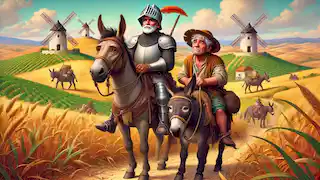Once upon a time, in a quaint village in La Mancha, Spain, there lived a man named Alonso Quixano. He was a gentleman of modest means, known for his kind heart and generous spirit. However, Alonso had one peculiar obsession: he loved reading books about chivalry and knights. His collection of chivalric romances grew so vast that it eventually consumed him. Day and night, he pored over tales of valiant knights, fierce battles, and noble quests, until reality and fiction began to blur.
One fateful day, Alonso Quixano made a life-changing decision. He would become a knight-errant, just like the heroes in his beloved books. He adopted the name Don Quixote de la Mancha, donned an old suit of armor that had belonged to his great-grandfather, and fashioned a helmet from pasteboard. His loyal steed was not a majestic warhorse, but a decrepit old mare he named Rocinante. Convinced that he needed a squire, Don Quixote persuaded a simple farmer, Sancho Panza, to join him on his quest by promising him governance over an island.
Their journey began with high hopes and grand ambitions, but it wasn't long before reality intervened. As they rode through the plains of La Mancha, Don Quixote spotted a cluster of windmills on the horizon. To his deluded mind, they appeared as formidable giants threatening the land. With a battle cry, he charged at the nearest windmill, only to be swiftly knocked off Rocinante by its rotating sails.
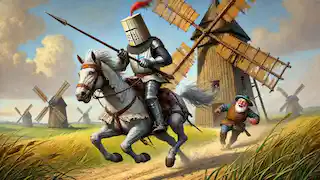
Bruised but undeterred, Don Quixote and Sancho Panza pressed on. They soon encountered a group of friars escorting a lady in a carriage. Convinced that the friars were evil enchanters who had kidnapped a noble lady, Don Quixote attacked them. The friars fled in terror, and the lady's attendants, misunderstanding his intentions, retaliated, leaving Don Quixote battered and bewildered.
Their next adventure took them to a bustling inn, which Don Quixote mistook for a grand castle. He demanded that the innkeeper dub him a knight. Amused by his delusions, the innkeeper played along and performed a mock ceremony. That night, Don Quixote kept vigil over his armor in the courtyard. When some guests at the inn tried to move his armor, he attacked them, believing they were thieves. The scuffle that ensued only added to his reputation as a madman.
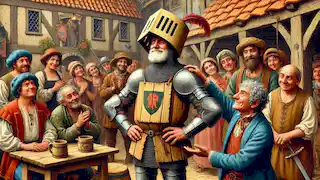
Despite these setbacks, Don Quixote's resolve remained unshaken. He and Sancho Panza continued their journey, encountering various individuals and situations that tested their courage and sanity. They came across a group of galley slaves being transported by the king's soldiers. Believing they were wrongfully imprisoned, Don Quixote freed them. Instead of gratitude, the slaves turned on their liberators, stealing their provisions and leaving them stranded.
As they wandered through the rugged terrain of the Sierra Morena mountains, Don Quixote decided to perform penance, emulating the knights in his favorite tales. He stripped down
to his shirt and trousers, made a pile of his armor, and instructed Sancho to deliver a letter to his lady love, Dulcinea del Toboso, a peasant woman he imagined to be a noble lady of unparalleled beauty.
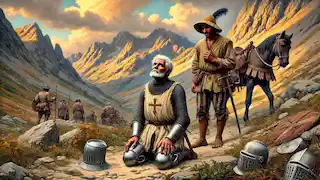
While Sancho was away, Don Quixote encountered a traveling barber and priest who, recognizing him, devised a plan to bring him back to their village. Disguising themselves as characters from his books, they tricked Don Quixote into a cage, claiming it was an enchantment. To their relief, the plan worked, and they managed to return him home.
However, Don Quixote's spirit was not easily quelled. After a brief period of rest, he convinced Sancho to accompany him on another quest. This time, he believed he had been called to combat a new menace threatening the realm. Their adventures led them to the court of a grand duke and duchess, who, having heard of Don Quixote's exploits, decided to have some fun at his expense. They staged elaborate deceptions, including a fake battle with a "giant" and a supposed enchantment of Dulcinea.
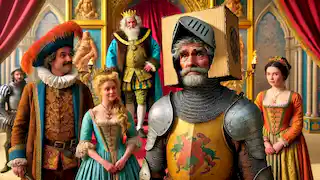
The duke and duchess's antics humiliated Don Quixote and Sancho Panza, but they remained steadfast in their quest. Eventually, they encountered the Knight of the White Moon, who challenged Don Quixote to a duel. The terms were that if Don Quixote lost, he would abandon his quest and return home. After a fierce battle, Don Quixote was defeated. True to his word, he returned to his village, his spirit broken.
Back in his humble abode, Don Quixote fell ill. As he lay on his deathbed, he reflected on his life and adventures. Surrounded by his friends and family, he renounced his chivalric delusions, recognizing the folly of his pursuits. With a heavy heart but a clear mind, Alonso Quixano passed away, leaving behind a legacy of bravery, madness, and unwavering belief in the ideals of chivalry.
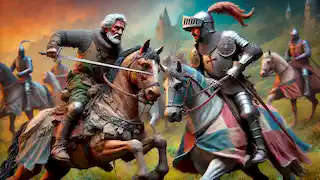
But the story of Don Quixote does not end with his death. His tale became legendary, inspiring countless others to dream, to believe in something greater than themselves, and to embark on their own quests, however absurd they might seem. In the hearts and minds of those who heard his story, Don Quixote de la Mancha lived on, a testament to the power of imagination and the enduring spirit of adventure.
